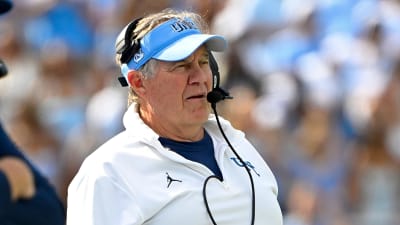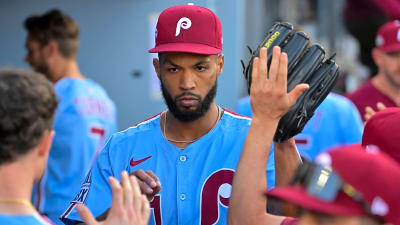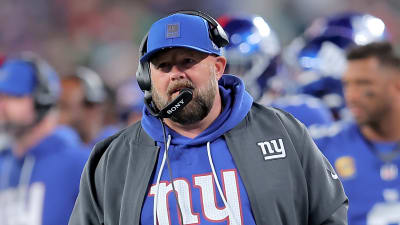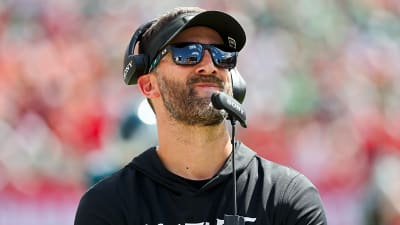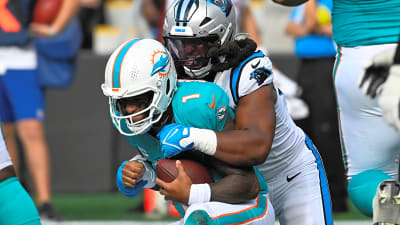
[Editor's note: This article is from Athlon Sports' 2025-26 NHL Preview magazine. Order your copy online today, or grab one at retail racks and newsstands across the U.S. and Canada.]
With a shot at history on the blade of his stick, Alexander Ovechkin wasn’t going to
miss.
He’d come much too far over two decades to fall short now—going from a kid in
Moscow with a dream to a grizzled veteran in Washington, D.C., chasing hockey’s most
hallowed record, Wayne Gretzky’s career mark of 894 career goals.
So when Ovechkin skated up the left side of the ice against the New York Islanders on a
Sunday afternoon on April 6, 2025, tied with Gretzky for most career goals, the crowd at
UBS Arena in Elmont, New York, held their breath. Trailing the play, Ovi received a
cross-ice pass from longtime Capitals teammate Tom Wilson at the top of the left face-
off circle—a place that had become the Russian’s personal office over the years—and
in one fluid motion, unleashed his patented laser-beam wrister.
The puck rocketed past the blocker of fellow Russian, goalie Ilya Sorokin, and with that,
the NHL had a new goal-scoring champion.
“They say that records are made to be broken,” said Gretzky, who knows a thing or two
about hockey’s record book, in the ensuing ceremony. “But I’m not sure who’s going to
get more goals than that.”
The Great One is right: 895 goals is, well, a lot of goals. To get there, even over 20
seasons, requires lighting the lamp an average of almost 45 times a year, year in and
year out. It’s a level of consistency that gives no breaks for injuries, off years, or the toll
exacted by Father Time.
Hockey is a tough, physical sport, and the clock starts ticking early. If you don’t get your
scoring in before the grind wears you down, you’ve probably missed your shot at
immortality. In a 2016 interview on NHL.com when Ovi was still chasing his record, Gretzky said, “I don’t mean this to sound egotistical, but the first 500 are the easy ones. It’s the next 500, when you’re getting a little bit older and your body is a little bit worn down, the travel and physical part of the game catches up to you.”
That is the conventional wisdom—and one of the major reasons why Gretzky’s mark
was long considered untouchable. The game has changed, too, from bigger, more agile
goalies and years when scoring was down, to multiple seasons interrupted by lockouts
and pandemics. Many would-be challengers came and went over the years since
Gretzky broke Gordie Howe’s record in 1994, including numerous Hall of Famers who
started strong but were unable to sustain their scoring pace long enough to even
remotely approach the Great One, much less mount a serious assault on his record.
Ovechkin might have ended up among that group, too, if he had followed the normal
pattern and trailed off in goal production as he progressed through his 30s.
But Ovechkin seemed to have been born to break this record. When he was a child in
Russia, his love of the game began not on the ice but in a toy store. At just two years
old, he refused to leave a Moscow shop until his mother bought him a plastic hockey
stick, puck, and helmet. He hadn’t even skated yet—but somehow, he was already
drawn to the sport that has defined his life.
It was his older brother, Sergei, who got Ovi onto the ice, taking him to practices and
games when his parents could not. Ovechkin’s mother, Tatyana, said in a 2020
interview that Sergei was the one who “taught [Alex] to fight to the end and give all of
himself on ice.” But when Ovi was just 10, Sergei was killed in a car accident. From
then on, Ovechkin was playing for more than just himself.
If his perseverance was apparent early on, so was his competitive streak—and knack
for breaking records. When he was 12, his father, Mikhail, told him that Pavel Bure had
scored 56 goals in a season at the same age. Ovechkin went into the last game on the
schedule with 53 goals. “Do you know what [Alex] did after I told him about the Bure
record?” Mikhail later recalled. “Scored six goals! Then I realized that something would
come out of this guy. Around the same time, scouts started talking about him.”
By age 18, Ovechkin had already spent three years playing against grown men with
Dynamo Moscow of the Russian Superleague (now known as the KHL), and he’d
impressed scouts not just with his skating and scoring touch, but also his intangibles. At
the 2002 U18 World Championships in Slovakia, many of the Russian prospects used
the tournament to showcase their personal skills to scouts, with coast-to-coast rushes
and puck-hogging antics. But as a 16-year-old competing against players nearly two
years older, Ovechkin stood out for the opposite reason; he played with purpose,
discipline, and maturity. By the end of the tournament, NHL scouts were unanimous:
This kid was going to be special. It was no surprise, then, that the Washington Capitals
selected him with the No. 1 overall pick in the 2004 draft.
After waiting a year through the lockout that wiped out the entire 2004-05 season,
Ovechkin finally made his NHL debut on October 5, 2005—the same day as the No. 1
overall pick in the 2005 draft, Sidney Crosby, made his debut for the Pittsburgh
Penguins. Scoring twice by the middle of his first game, Ovechkin had begun his pursuit
of greatness. He ended his first season with 52 goals, the most among NHL rookies and tied for third-most in the league.
Ovechkin also showed he had a flair for the spectacular goal. His rookie season gave
us speedy goals on the rush, powerful goals with Ovi muscling his way to the net, one-
timer snipes from that trademark left circle, and of course, a jaw-dropping no-look
backhander while sliding along the ice against the Coyotes on January 16, 2006. For his
efforts, it was Ovechkin, not Crosby, who won the Calder Trophy as Rookie of the Year,
adding spark to a rivalry that would come to define the league for decades.
Multiple 50-goal seasons—and even a 65-goal season in 2007-08 (the most since Mario Lemieux netted 69 in 1995-96)—followed, and Ovechkin had the fifth-most goals before age 30 (475) of any player in NHL history. Still, few imagined he’d ever truly challenge Gretzky. The other names on that list had eventually faded—through injury, age, or circumstance—and Ovechkin’s timing seemed especially cruel. His rookie season was delayed by a lockout; another lockout cost him half of 2012-13, right in his prime. Later, COVID-19 shortened two more seasons just when he needed every goal he could get.
Still, Ovi kept scoring. He led the league in goals seven times in eight seasons between
2012-13 and 2019-20, including four 50-goal campaigns. (In the middle of that run,
2018, he also lifted his team to their first Stanley Cup.) Like Hank Aaron chasing Babe
Ruth, his greatness lay in his consistency—never exploding past Gretzky’s pace, just
outlasting it. Suddenly, by the start of the 2020s, the record no longer seemed out of
reach.
Even then, the final stretch demanded something unprecedented. Gretzky had just 80
goals from age 35 onward; to break the record, Ovechkin would need 2.4 times that.
And despite a leaguewide surge in scoring after the pandemic—one last lucky break to
mildly offset all the earlier unlucky ones—Father Time still loomed. Ovechkin started to
show uncharacteristic vulnerability: a late-season injury in 2021-22, a dip in form in
2022-23 and 2023-24, and then a fractured fibula in early 2024-25.
At age 39, the record had never looked closer … but it had also never looked more
uncertain. True to form, though, Ovechkin responded with one of his best scoring
stretches after returning from the broken leg. He surged past 880, then 890. Once No.
895 was in sight, the record felt as inevitable as one of those trademark Ovi blasts from
the left side of the slot.
On April 4, he scored two in the third period against the Chicago Blackhawks to tie the
record at 894. Down 4-3, Chicago pulled its goalie. On camera, Ovi could be seen
telling his coach, Spencer Carbury, that he did not want to go for the hat trick and the
record-breaker. He confirmed it in a later interview: “I tell him I don’t want empty net.” The quote became a social media meme, and a testament to how Ovi has spent his career playing the right way.
Instead, that goal came against coach Patrick Roy’s Islanders. It was a touch of irony.
Roy had helped popularize the butterfly goaltending style, which played a role in ending Gretzky’s era. Now he was behind the bench as Ovi put his stamp on an era he had defined on his own terms. The Great 8 had survived work stoppages and a global
pandemic, pushed through injuries and even aging. He helped bring pure goal scoring
back to the core of hockey, and this was the reward at last.
For Ovechkin, the record was more than a number. It was a monument to perseverance and consistency, to the joy he takes in his sport. Who else could become a Russian hero in the American capital, and prove that even so-called unbreakable records can be broken?
Ovechkin has one more year on his Capitals contract, and has confirmed that he will
play his 21st season. (He turned 40 on Sept. 17.) While his record stands
at 897, he will push it into the 900s.
Whatever the new mark is, we are left asking the same question: Will that number ever
be surpassed? Maybe. But if it is, it will take another player like Alex Ovechkin—and
that’s not the kind of player who comes along very often.
More must-reads:
- 13-year NHL veteran announces retirement
- Golden Knights to sign star center to $108M extension
- The 'Most NFL QB two-rushing-TD games' quiz
Breaking News
Trending News
Customize Your Newsletter
 +
+
Get the latest news and rumors, customized to your favorite sports and teams. Emailed daily. Always free!
